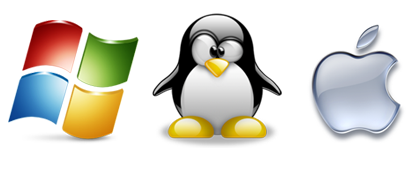Guest Author

Thanks, Bubblews.com
No simple solution satisfies the Linux, Windows, or Mac for Business debate. If you’re truly a cost conscious entrepreneur who also understands software functionality, then you can’t overlook Linux. But you’re accustomed to Windows? Your graphic designer wants a Mac Pro. How do you move forward?
The exact cost differences for Linux, Windows, or Mac are difficult to determine. Numerous factors affect the pricing such as the size of the business, preferred hardware, software compatibility to hardware, employee preference, and attaining laptops without operating systems installed.
Buying hardware with or without an OS
Whether you’re a company of five or twenty five individuals, then purchasing laptops piece by piece is an unfavorable idea. Rather than focus on the short term, consider the option of buying laptops directly from the distributor such as Lenovo, Toshiba, HP, or whomever. You can try to have the OS pre-installed before delivery or attempt to have nothing on the system.
Finding laptops without an OS installed is a difficult task. You can locate a good deal on a laptop with Windows pre-installed. I If you seriously consider Linux, the perhaps buy a computer with Windows installed, run a distro of Linux virtually to soften the learning curve, and when the time for renewing the Microsoft license fees arrives, switch completely to Linux. Otherwise, do not try to track down OS-less laptops.
The annual cost of Windows
Purchasing the licenses and dealing with the upsells for additional software features is a confusing process only best explained by a sales representative. If you deal with more than five licenses, then it’s probably the best idea to talk to one of these reps to receive a price quote.
You easily spend money on Windows 8.1 Pro, more cash on the Microsoft Office suite, and additional funds on programs necessary in the Windows world.
Are you a Mac person?
You see what you get and that’s what you use. When you purchase Macbook Pro laptops, iPads, and even iPhones, you pay for the exclusive product, a simple exterior design, and a user-friendly interface. Graphic designers tend to lean towards Mac for the media and design friendly programs.
You can attempt to offer the use of these laptops to specific privileged employees, such as graphic designers, but deciding if the excessive price is worth the investment, rests solely in the owner’s hands.
The OS X seems to deal less with security vulnerabilities, software issues on the whole, and less complaints come out of Mac users’ mouths.
Ubuntu 14.04
In recent years, Linux gained significant ground. As I pointed out in a previous post, the Howard County Library decided to ditch Windows for Ubuntu. Earlier this year, the Penn Manor High School completed a project in which 1,700 students began using Acer laptops with Ubuntu.
If a high school can create a support system through a student help desk for the transition, then using Ubuntu for business purposes is certainly possible. The Howard County Library used Ubuntu for years. Within this public setting, they rarely encounter issues with public users.
The cost of imaging laptops for employees with Ubuntu 14.01 (the newest release), is free. Ubuntu 14.04 is one of the easiest to install, coming with compatible software already installed when booted on a computer. Although you would need an experienced Linux professional who supplies support and guides employees through the learning curve. When searching for this professional, pay attention to experience and relevant certifications on resumes.
Is Linux worth it?
Skeptics often claim that free products or services usually boast poor quality. With Linux, laptops are not weighed down with unnecessary software. The boot time is remarkably fast compared to Windows.
The strong community support behind open source distributions lends Linux an upper hand in battling security vulnerabilities. The source code receives constant attention, updates, security patches, and other support that is limited with closed source software.
The only downfalls come in the form of Microsoft Excel and Adobe. The open source software office suites, LibreOffice or KingSoft Office, fall short in terms of Excel’s capabilities. Gimp does a great job as an alternative to Adobe Photoshop, but Adobe remains superior.
Is there room for Chrome OS?
Chromebooks are the hottest selling laptops on Amazon. This operating system originates from the open source Chromium Project. Google developed this OS for maximum efficiency by reducing the amount of RAM used on each laptop, focusing on the processing speed, and taking advantage of cloud technology instead of installed software that may slow the machine down. For example, instead of using the Microsoft office suite, individuals rely on Google Docs.
For the light PC users who spend time browsing the web, composing documents, and other minimal tasks, Chromebooks are a good value for the price. They range in screen size and are available on Acer, Samsung, Toshiba, and HP laptops.
Simplifying the OS debate
Microsoft Windows is the default option for all computer users. Mac presents an ultra refined user experience with the smooth and glamorous design to show off to clients. It’s all about the image. If you’re a penny pinching, frugal minded, gritty entrepreneur, then you may opt for the black sheep, one or multiple Linux distributions.
